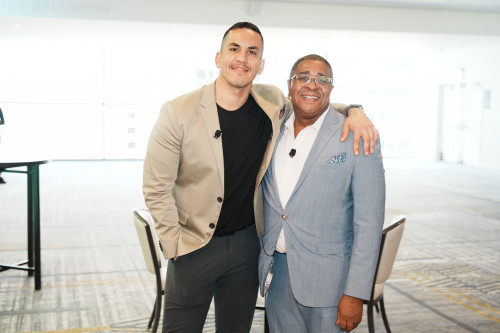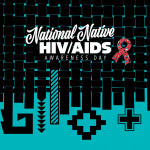Evolving through leadership:
The long game of leadership has many seasons. So when a constituent asked me, at the 2024 Biomedical HIV Prevention Summit’s closing plenary, “Why didn’t we see you on the main stage?”, I realized the need for an explanation.
For me, the role of leading has always been about fortifying NMAC. Over the last 35 years, I’ve had my time on stage while also running the house. In this season of leadership, I shift focus to strengthening NMAC’s long-term infrastructure so we can survive the 2024 election outcome. Our movement is potentially coming up against some very rough times, and we all need to be ready. This doesn’t mean I’m leaving; it means that I recognize that it’s time to pass the public-facing roles to the next generation, while I continue building behind the scenes.
Therefore, Harold Phillips, in his role as Deputy Director of Programs, is NMAC’s official spokesperson. Like he was the Summit, he will be front and center at 2024 United States Conference on HIV/AIDS.

Paul Kawata at the 2024 Biomedical HIV Prevention SummitCourtesy of NMAC
Securing the HIV movement’s future:
Just as much as we’re working to secure NMAC’s internal infrastructure, we rely so much on HIV donors to understand our community’s future challenges and lean into the opportunities that emerge from those hurdles! Our movement needs strong national organizations, many of them to be led and managed by People of Color, to reflect the epidemic’s greatest impact. In addition to NMAC, we need strong institutional representation to be your voice in Washington and a trusted resource to the community. We have known for a long time that this is much bigger than just us. That’s why, during the Summit, NMAC met with and asked multiple federal and corporate donors to make significant investments into communities hardest hit by HIV. By funding organizations working on the frontlines, federal and corporate donors will insure our stability during these uncertain times. Organizations like the Normal Anomaly Initiative in Houston.
Deep-rooted in community, The Normal Anomaly leads with the mission of “Centering Black, queer plus persons to overcome barriers, end stigma and problematic narratives to actualize a new normal.” They reminded me of why I do this work and the urgent need to support the organizations that can reach community. Visiting them and seeing their work in Texas gave me so much joy and appreciation for the frontlines. Like in the early days of the epidemic and the fight for LGBTQ rights, here are community leaders working to make it better in a state where lawmakers make laws that do LGBTQ individuals no good and continue to inflict systemic harm. Texas, like most of the southern states, is much more frightening when you get to see things up close. I salute everyone working in that region. They really need all of our support. They are fighting a war that is incomprehensible to most of us who live in other parts of the country.
So Goes the South, So Goes the Epidemic:
Because of the relentless attack on the HIV movement in the south, this year’s United States Conference on HIV/AIDS will tell Southern stories. With the focus on the south, Texas has a unique story to tell that should scare everyone into action this election year. To be candid, while I admire the courage it takes to do HIV/AIDS work in Texas, I fear their reality today could be the future for us all. Too many southern states are making drastic and long-impacting laws and processes that impact our ability to get the work done. While I often talk about racial inequities, the south is my reason and reminder to talk more about geographic inequities, especially in states refusing Medicaid expansion.

Francisco Ruiz (left) and Harold Phillips at the 2024 Biomedical HIV Prevention SummitCourtesy of NMAC
We keep on marching forward:
So much gratitude for our 1000+ attendees at the 2024 Biomedical HIV Prevention Summit that included multiple federal, community, and HIV donors. The 2025 Summit will focus on Innovation. The world of biomedical HIV prevention is rapidly changing; why is information still not reaching our communities at the pace it needs to be effective? Is our movement ready for long-acting HIV therapies? Do we have the systems to manage these new modalities?
The 2025 Summit hopes to highlight these questions and more, to start a dialogue, and to continue bringing federal partners together with leaders from the communities highly impacted by HIV. To be clear, this is a radical rethink for how medications are provided and the programs needed to support uptake and continued engagement. Once again, the HIV community is leading the way for how public health science and solutions can serve the people who need it most. The data from these roll-outs could impact multiple other health conditions. There are billions of dollars at play for the pharmaceutical company that makes the most ethical and effective decisions. I want to remind all of them that they can’t do it without community being centered at every point.
Closing out with the politics that will define our efforts this year: Texas, the 5th circuit, and the fall elections have me concerned. While the results are way beyond our control, I can tell you our movement must get ready. Over the next few months, I will outline some key next steps, but it starts with talking to HIV donors. What they decide could make the difference between building a movement that can withstand the times, or watching it slowly fall apart from changing political winds.
Yours in the struggle,
Paul Kawata








Comments
Comments